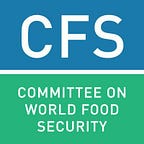CFS Calls for Building Back Better to Avert a COVID-19 Food Crisis
By Thanawat Tiensin
In March 2020, the Bureau of the Committee on World Food Security (CFS) along with members of its (ad hoc) Advisory Group convened a virtual video conference to discuss COVID-19 and its impacts on food security and nutrition. The discussion utilized the interim Issues Paper on the Impacts of COVID-19 on Food Security and Nutrition by the CFS High-Level Panel of Experts (HLPE) along with expert briefings from the three UN Rome-based Agencies, the World Health Organization, and the UN Secretary-General’s Special Envoy for the 2021 Food Systems Summit.
A lot has changed since then with the latest estimates indicating that the number of COVID-19 infections globally is approaching the 5 million mark with more than 300,000 deaths. This has sounded the alarm bells on the rise in global food insecurity linked to the pandemic. CFS is deeply concerned that the pandemic is likely to worsen the world hunger situation that has been on the rise since 2015 resulting in over 820 million people going hungry according to The State of Food Security and Nutrition in the World 2019 (SOFI) report.
It is against this backdrop that, as the CFS Chairperson, I recently convened a special meeting on COVID-19 responses by our Advisory Group members including the Rome-based UN agencies, international organizations, representatives of research institutions, farmers’ organizations, the private sector, and the civil society to avert a global food crisis.
The resounding message from these discussions is that the world has enough stock of key staples — rice, wheat, maize and soya — and we do not expect supply shortages this year. However, the more concerning challenge is of localized food access which has been impaired in many places due to supply chain disruptions, logistic restrictions, and income losses. In addition, as demand for food will decrease over the next months, prices are expected to go down in 2020, likely having a negative impact on incomes and livelihoods of farmers and other stakeholders in the agricultural sector.
Restrictions on movement within and between countries are impacting food-related logistic services, disrupting entire food supply chains, and affecting the availability of some food products, especially fruits and vegetables. The impacts of restrictions on the movement of agricultural labor and on the supply of agricultural inputs like seeds and fertilizer could pose critical challenges to food production, thus jeopardising food security. At the same time, reduced or lost income due to job losses and reduced remittances is impairing people’s ability to buy food which is impacting both the livelihoods and nutrition of communities.
With transport disrupted, many perishable crops, unable to reach wholesale markets in time, are going to waste. This adds to global food loss and waste that the FAO estimates costs about US$400 billion annually — an amount that could feed around 1.26 billion people a year.
Worryingly, COVID-19 has led to the diversion of resources and attention from other pre-existing challenges like climate change, desert locust invasions in the Middle-East and East Africa, conflicts, hunger and malnutrition, among others. By compounding these existing challenges, the pandemic is disproportionately impacting the poor, those already struggling with diet-related illnesses, and the most economically vulnerable.
Despite the challenge, many countries and organizations are mounting efforts to keep food and agriculture allied businesses safely running as essential services. They are also keeping markets well supplied with affordable and nutritious foods, and we are seeing varying efforts to enable consumers to continue accessing and purchasing food despite movement restrictions and income losses while also ensuring food prices are viable for producers.
Members of the CFS Advisory Group shared in great detail some of the responses they are driving and the impact these interventions are having in supporting countries and communities deal with the pandemic. A summary of the presentations is available here.
As the extent and the longevity of the COVID-19 pandemic and related food crisis is still unknown, we have to start building back better by transforming our food systems to strengthen resilience to future shocks and to ensure they are more equitable for all. This calls for solutions that will last for the future while meeting the immediate needs of vulnerable populations.
At CFS, we recognize the vulnerability of our food systems as exposed by COVID-19. We also note the importance to restore the right balance between human activity and nature. This ambition is at the heart of our ongoing work to develop the “Voluntary Guidelines on Food Systems for Nutrition”. These Guidelines, to be endorsed at CFS 47 in October this year, will provide science- and evidence-based guidance on effective policies, investment and institutional arrangements that will address all forms of malnutrition from a food systems perspective. We have also started a process of policy convergence on agroecological and other innovative approaches aimed at transforming the food system to feed the world in a healthy and more sustainable way.
We have a duty to ensure that the pandemic does not lead to an even larger global food crisis. CFS will continue playing its role as a unique UN platform for policy coordination and convergence to guide the discussion, debate and action towards food security and nutrition for all. We hope that governments and other actors will find CFS policy products useful in their effort to strengthen the sustainability and resilience of their food systems.
Thanawat Tiensin is Chairperson of the Committee on World Food Security (CFS).
